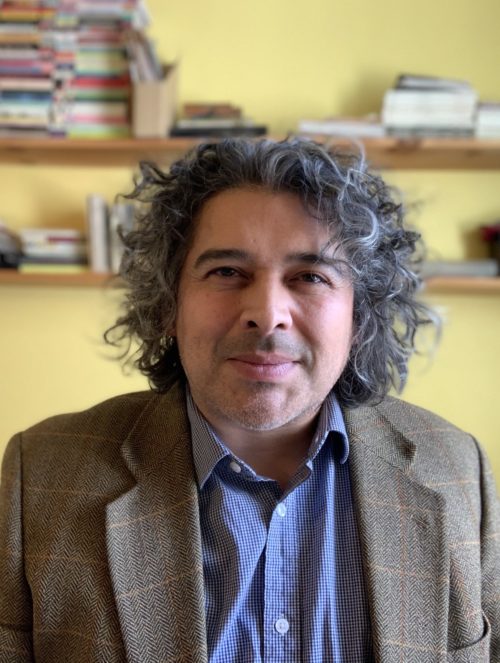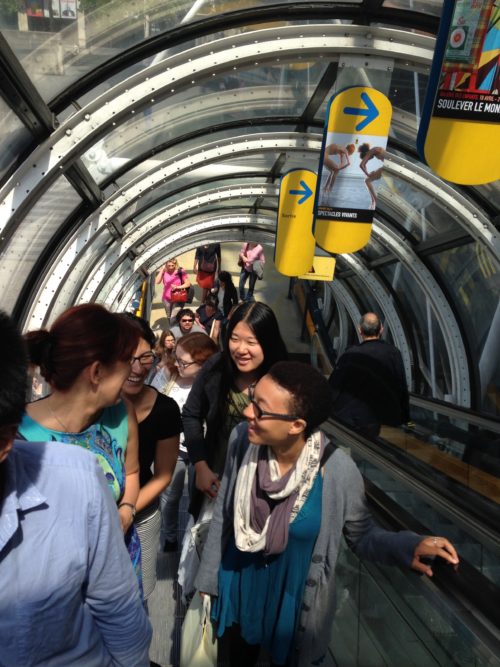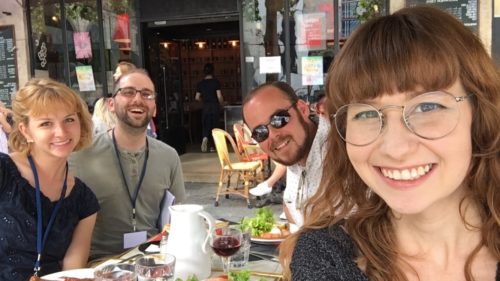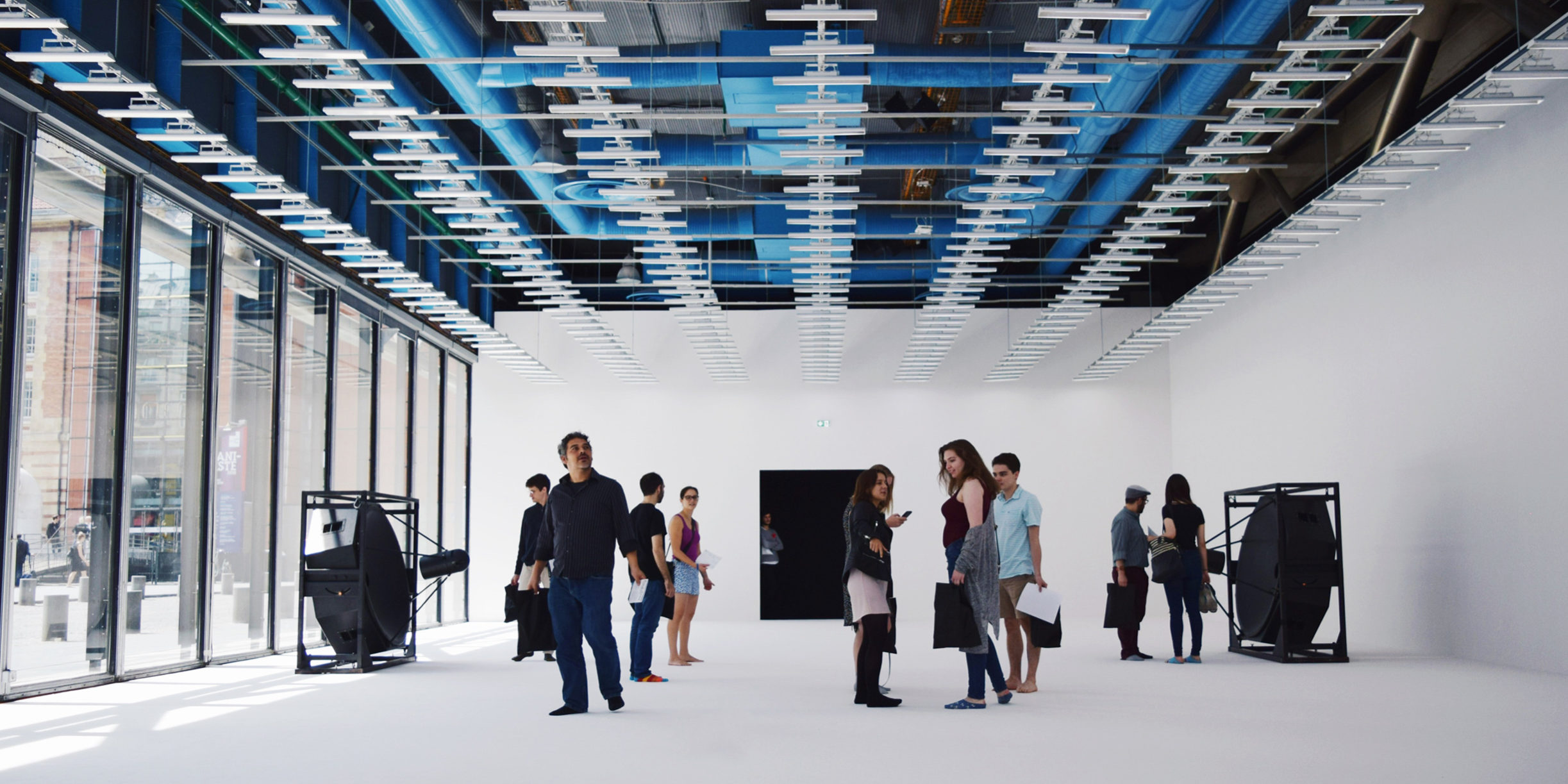Summer@Eastman’s Paris Study Abroad course, created by Professor Robert Hasegawa, has been a student favorite for years! In addition to the delightful prospect of four weeks in Paris (in June!), the course is built around summer activities and the ManiFeste concert series at IRCAM, one of the world’s leading centers of contemporary music. Through workshops, concerts, and sessions with guest composers, students take a deep dive into new music, exploring the techniques and structural ideas used by contemporary composers. To learn more about the program, Summer@Eastman’s Marketing Assistant, Joyce Tseng, interviewed Professor Hasegawa. Featured image photo credit: Catherine Chapman (2018)

Professor Robert Hasegawa
JT: You have been teaching the Study Abroad course in Paris for 10 years now. How did this program start?
RH: Yes, that’s right! The first edition of the course was in 2012, and we’ve been meeting yearly since then, skipping 2020 and 2021 due to the COVID-19 pandemic. I came up with the idea of the course while teaching music theory at Eastman: I wanted to offer students the chance to have first-hand experience hearing new music concerts in Paris while simultaneously engaging in a deep study of scores and composer writings. When I put together the syllabus each year, I make sure to include pieces by the composers featured in the ManiFeste concert series, so every year is different and designed to provide context for the new music premieres we’ll hear in the festival.For the first few years of the class, we met for only two weeks. Starting in 2014, the course expanded to four weeks, including two spent auditing the summer academy at IRCAM (the Institut de recherche et coordination acoustique/musique), the organizers of the ManiFeste concert program and a leading centre for new music worldwide. This association with IRCAM supplements our class meetings with a chance to hear open rehearsals, masterclasses, instrument demos, and composer lectures along with an international group of emerging composers and performers.
JT: What do you always look forward to?
RH: The concerts in the ManiFeste program are always full of surprises and new discoveries. A few ensembles return almost every year, and I’m always particularly excited for the performances by Klangforum Wien and the Ensemble Interconemporain. I also really enjoy bringing composers, performers, and musicologists into the class as guest speakers: visitors in the past have included Chaya Czernowin, Pascale Criton, Frances-Marie Uitti, Clara Iannotta, Franck Bedrossian, and Yan Maresz. It’s a great opportunity to talk with these creators in an informal and small-group context: I’ve learned a lot from their visits and I know students have found these meetings particularly inspiring.

PC: Matthew Doiron (2015)
JT: What is unique about this year in terms of repertoire and guests?
RH: This year’s ManiFeste concert program has a fantastic mix of classic mid-century modernism and new works by contemporary composers. The programming marks a few important anniversaries with major works from Edgard Varèse (140 years) and György Ligeti (100 years) including Varèse’s Ameriques and Arcana and Ligeti’s Lux Aeterna and Drei Phantasien nach Friedrich Hölderlin. I’m also happy that there are concerts featuring major works of spectral music (my own area of research) such as Kaija Saariaho’s Lichtbogen and Gérard Grisey’s Quatre chants pour franchir le seuil, featuring Eastman alum Sophia Burgos as soprano soloist! Among the new premieres in the festival this year, I’m especially looking forward to hearing works by Sina Fallazedeh, Aida Shirazi, Sasha Blondeau, and Rebecca Saunders.
JT: How would you describe a typical day for students in this program?
RH: Most of our seminar meetings are concentrated in the first two weeks of June, with four meetings per week. On those days, we usually meet from 10:00am to 1:00pm to discuss scores, readings, and recordings. I like to use this time to present new theoretical and analytical techniques and to work on detailed analyses of works by composers featured in the festival. When it’s not possible to hear the specific work that we’ll hear in concert, I try to choose earlier music by the same composer. Sometimes a guest artist will join our class during this period to present on their music. We often lunch together (especially in the first week) and the afternoons are left free for exploring the city’s neighborhoods and museums.
In the second half of the course, our schedule changes quite a lot as we spend most of each weekday at the summer academy at IRCAM: as auditors of the academy, we’re part of a larger group of composers and performers attending composer talks, masterclasses, and open rehearsals. It’s a chance for a “behind-the-scenes” look at the festival concerts and to learn what’s important for contemporary composers in their work.
During the whole month, we also attend a lot of concerts: usually 15 to 20 over the course of the festival! The concerts take place in venues all over the city, including the Centre Pompidou, Philharmonie de Paris, and Cité de la musique.

PC: Rebecca Gaspelin (2019)
JT: What would you say to students who are interested but are hesitant about going abroad?
RH: Paris is a very safe and welcoming city, and easy to navigate even without a knowledge of French: for students traveling abroad for the first time, it’s a great introduction to Europe. I’ve heard from multiple students that they appreciate how the course structure makes it feel like they are really living and working in the city, not just passing through as tourists. And of course, Paris has a lot to offer beyond our classes and concerts: there are amazing museums, historical sites, architecture, and (certainly not least) food! And finally, the small size of the class (usually 10 to 12 students) offers a good support network of like-minded musicians, as well as companionship for exploring the city.
**
The Theory and Analysis of Contemporary Music: Study Abroad Course in Paris (TH 402A) runs from May 26-July 23, 2024. Applications are due February 1. Visit our website for course details and application information.

